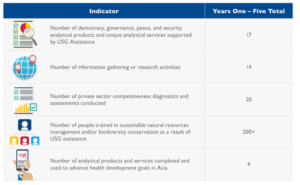In 2024, Integra was awarded USAID Indonesia’s Health Technical Assistance Project II (BANTU II). BANTU II is a five-year task order awarded to Integra in partnership with FHI 360. BANTU II provides specialized technical assistance to support USAID Indonesia’s health programs and CDCS strategies, the Government of Indonesia, sub-national government, NGOs, CSOs, academic institutions, and other research institutes. Additionally, BANTU II coordinates a diverse pool of professionals and organizations with specialized expertise that may be lacking in the health systems but are critical to the success of Indonesian public health programs.
In support of start up efforts, Integra assigned Ganyapak (Pin) Thanesnant, the Activity Project Director/Contract Manager, to travel to Jakarta, Indonesia in early April to meet with the local team and ensure the smooth launch and onboarding of additional staff. The visit included conducting orientations for the staff, implementing the work plan and other critical deliverables, establishing compliance and reporting systems, reconciling financial and results tracking systems, among other tasks. Additionally, Ms. Thanesnant met with USAID/Indonesia representatives to discuss progress updates, country registration, project pipeline, and other important matters.
Throughout BANTU II’s first year, the team has successfully onboarded it’s key personnel and kicked off its first nine task orders. Through three overall objectives, BANTU II will provide rapid and targeted technical assistance, meeting and logistics facilitation support, and targeted capacity building assistance and support to meet USAID/Indonesia’s objectives.
- Objective 1: Provide short-term and long-term technical assistance
- Objective 2: Arrange meetings and provide other logistics
- Objective 3: Support local organizations to address gaps in their organizational capacity
The majority of tasks orders thus far received have been related to objectives 1 and 3.






































